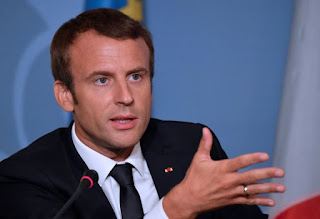 |
| Photo Credit: French President Emmanuel Macron www.liberation.fr |
President Emmanuel Macron
likes to convince people. In manner and method, he is unlike his
predecessors. Nicolas Sarkozy cajoled and bullied. François Hollande
just gave up. Macron fixes interlocutors with his intense blue stare and
builds a Cartesian argument. If that doesn’t work, he starts over,
patiently, but with determination. The past week has tested the young
president’s powers of persuasion. Early in the hours of April 14th,
Macron used his constitutional power as commander in chief for the first
time, joining the US and Britain in launching cruise missiles against
three chemical weapons installations in Syria. The goal, Macron said
later, was to convince Bashar al Assad and Vladimir Putin that the
international community was more than a “nice” and “weak” body they
could push around. In a further exercise in
persuasion, Macron volunteered for a combative, 2½ hour live television
interview on Sunday night, during which he made the surprising claim
that, “Ten days ago, President Trump said the US would pull out of
Syria. We convinced him it was necessary to stay for the duration.” The White House later issued a
statement saying Trump’s view had not changed, and the French president
made an embarrassing climbdown on Monday, claiming he “never said” the
US or France would remain militarily engaged in Syria for the long term. Perhaps Macron, whose nickname is “Jupiter”, is threatened by hubris, the sin of pride that afflicted Greek gods. The rest of the week was one long
attempt to convince Europeans and the French of the rightness of his
positions. Macron – who has become the de facto leader of Europe
– received the heads of the three Baltic states who have teamed up with
five other northern EU countries, including the Netherlands and Ireland, to thwart his efforts to further integrate the euro zone. Then, before a more sympathetic
audience at the EU parliament in Strasbourg, Macron pleaded with
proponents of liberal democracy to wake up and oppose the populist
authoritarians who deny European values. Macron then travelled to Berlin
in yet another effort to enlist German chancellor Angela Merkel’s
support for his European reform agenda. On Monday, Macron will go to
Washington for a three-day state visit, the first of Trump’s
presidential term. Although the two men have clashed on climate change,
the Iran nuclear accord, trade protectionism and the rise of
Eurosceptical populism, Trump appears to have been charmed by the young
president, who says Franco-American co-operation is crucial in the fight
against terrorism. The Irish Times